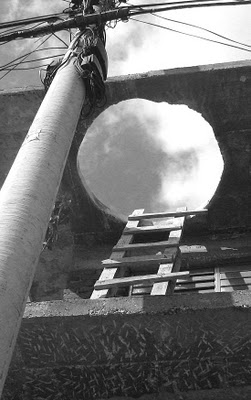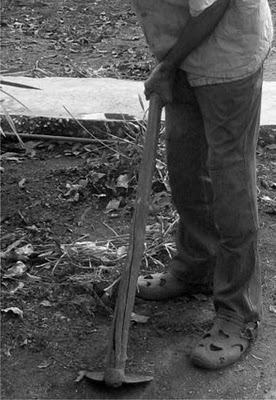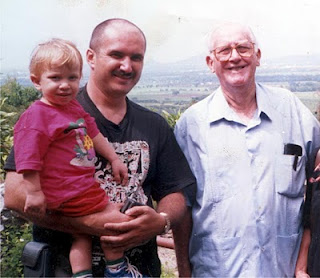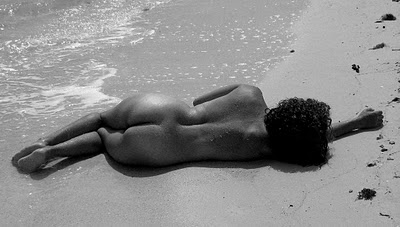
Photo: Francis Sánchez
[I have decided to publish, before this blog is closed down, some texts that I didn’t publish at the time because it was practically impossible to do it because of obvious difficulties or because as time passed I doubted that it would be the best idea. Due to recent events, I think it is best not to leave them unpublished. They are the following texts: the article “Guatacas” (Hoes), the poem “La palabra Abedul” (The Word Abedul) and the documents “Carta abierta a un amigo” (Open Letter to a Friend) and “Aclaración al lector” (Clarification to the Reader). The last work that must be published on this blog is “Cerrado por demolición” (Closed for Demolition), which will appear in three parts or submissions: “La cosa en la red” (The Thing in the Net), “Puntos negros” (Black Points) and “Nosotros y las nubes” (We and the Clouds).]
I. The “Thing” in the Net
When I opened this blog, only some five months ago, I told the story of a night full of nightmares, the time that my wife almost collapsed and I was at her side for us to survive impotence and frustration together for reasons that are explained in the post “Mass Layoffs. Dissolve the public?” Now this blog called “Man in the Clouds” is closed down or nailed to the air with this article which, under the title “Closed for Demolition” I plan to publish in three parts or submissions, after I have once again lived through a night of horror. Cuban television has just shown, at the top hour of eight-thirty at night, a new chapter of the series “The Reasons of Cuba”, with the title “Cyberwarfare”.
I had promised myself to try to never hurt, much less attack, other people in my writing, as well as to not defend myself from that type of low blows when I became a target because of my points of view–to encourage personal disagreements or mudslinging, supposedly among intellectuals, is an undertaking of destruction and ethical poverty in which the principal investors in immobility and censorship are accustomed to place their ample resources, betting on empty, on despair and generalized revulsion–but it seems I have no alternative but to break the second of my resolutions and defend myself. I will do this because essentially it won’t even be self-defense, which is a luxury impossible for me to properly undertake given the very excessive and even abstract disproportion between my attacker and myself. It seems the critical hour has come and I want, while I still can, to denounce injustice and put my ideas and my position down in writing.
The faceless apparatus of the political police accuses me, among the few “independent bloggers” that exist in Cuba, to be in the pay of the United States government. “Cybermercenaries in Cuba” wrote an invisible hand on the Google search engine and, to the horror of my family, I do not know which shady search engine could have produced as a result of this television program showing a page of my blog on the small screen. Enrique Ubieta, who often shows up to defend the powerful “Raison d’Etat”, author of some book he was asked to produce and director of the newspaper “La calle del medio”, at one point says to the camera that this is obviously some ambitious guy who, like somebody who sets up a fried food stand, is trying to get through the economic crisis very easily by getting on the Internet for money paid by Washington. It is unbearably false that my blog be shown here, even a single page for a fraction of a second, but it happened and I saw it, and the most horrible part is that it is linked to my profound impotence. I don’t have to say that I have never set foot inside the USA Interest Section in Havana, nor have I earned or aspired to earn a cent for writing or recording my ideas on a personal blog. A blog that began one day in search of my own breathing room as a marginalized intellectual. A marginalization whose degree has increased a lot since, in early 2007, I published my text “La crisis de la baja cultura” (The Crisis of Low Culture), loaded with a strong dose of social criticism, at the same time as those events that some have called “the email crisis”.
To write, create and reflect, defending the hypothesis of full internal freedom, is something that I have had since I was a child, like breathing. But it makes no sense for me to try to run faster than the lies, since a larger truth is common knowledge, atrocious and popularly incorporated into people’s daily survival mechanism in the face of despotism and the Mystery Syndrome in Cuba: the key is not to predict the problem you might get into, but the one the want to create for you. I, like any individual, lack legal mobility inside a monotonous system, and the most I can hope for is that they pardon my life in order not to air dirty laundry in front of third parties. The structure, the true apparatus of power, works in the shadows. The convictions and activities that any individual may be involved in that show any degree of rejection of the system will be just one set of little crystals under a magnifying glass, a microscope or a telescopic viewer, according to each clinical evolution.
Some months before, a video had leaked through–circulated on a flash drive to another–that was of a conference given to some colleagues by a specialist from the Ministry of the Interior, entitled “Enemy Campaigns and Policies for Confronting Counterrevolutionary Groups”, in which the theme of the new technologies was addressed. On the topic of the blogosphere, he made the following comment:
“They want to create in our minds the concept that the blogger is a kind of enemy of the Revolution. If we take on the bloggers now, we will really make an enemy for ourselves.”
The presenter doubtless was alluding to the process of criminalization that, before the Internet and blogs, over time had made against other technologies that had empowered people: video cameras, video cassettes, computers, printers, mobile phones, to give just a few examples, as well as concepts such as civil society and branches of science like sociology. Which reminds me that, in 1998 when I got my first computer with a printer connected, a cultural assembly registered a complaint against the “danger” that was in my house, which was made by the director of the provincial library. The operating strategy, nevertheless, apparently was going to suffer a radical shift, going from the supposed precaution of a private meeting to the public offensive tactic of the establishment of a new prohibitive code that, following the war manual, reduces a problematic social reality to an epithet, a discrediting term for a person who asks for rationality, but gets echo, euphoria, unconditional repudiation: “cybermercenary” is the new word that overwrites so many other terms that have historically been put in the mouths of the masses.
The day after the previously mentioned television program showed, the newspaper “Granma”, official organ of the PCC (Cuban Communist Party), would publish an even more inclusive and horrific accusation, which apparently left me before the masses labeled just as one more venal soldier, but with all the colors of the typical beast for whom the hunting season never expires in public spaces: pro-Yankee, traitor, terrorist, in other words a monster ready for lynching, packing and sending to hell. In a provincial town like Ciego de Ávila, where I live, going to hell is not a very long trip. These processes of demonization had already begun long before, with a harassment that became progressively less veiled. Now it is the spying, vigilance and persecution I suffer all the time. A meeting was even called by the First Secretary of the Provincial Party at which intellectuals and journalists were exhorted to avoid me. One fine day somebody robs me, takes my cell phone out of my wallet. Another day someone comes to let me know they have been recording and filming me. From one day to the next a literary activity that some careless promoter was kind enough to organize for me and my family is cancelled. Suddenly the television, on the program of March 21 previously mentioned, puts a moral price on my photo. And finally, as a climax, “Granma” publishes multiple accusations, which are also so exaggerated that I am able to refute them all at the same time. Luckily, the activity of a writer and the social reflections made on a blog have the objective of staying afloat, of opening oneself to scrutiny, letting the light in that so bothers those who live in shadows and speculation. So instead of saying “lie” a thousand times, I can limit myself to asking in what part of my texts I have advocated any of that which is imputed to me here:
“These bloggers […] have exhorted people to rise up in Cuba, have promoted violence, support the Cuban Settlement Law, justified the blockade, deny that the most reactionary sector of Miami is the enemy of the Cuban people, say that the case of the terrorist Luis Posada Carriles is a smoke screen and even go so far as to openly express [sic] the change of the political system […].”*3
The latter reproach is very confusing since the editing evidently failed, but it is worth doubting if, in order to straighten out the text, the “official organ of the party” would be willing to do without the Marxist dialectic that has theoretically justified the Cuban political system and which recognizes in social relations a non-linear process, an object of permanent transformation. Would it be inhuman to live according to the universal maxim, so romantic and absolute, of “change everything [everything!] that must be changed.” Or rather is it not monstrous that someone can decide what everything is for everyone? An identical paradox was presented to intellectuals in June of 1961, in a meeting at the National Library, under the banner of “Inside the Revolution, everything. Against the Revolution, nothing” (this year is the fiftieth anniversary of this event), so that these [intellectuals] could entertain themselves for a long while “sucking on this stone”. Life would show that no one was going to find an escape from the rhetoric of power, no one except the subject master himself, much less intellectuals with the “original sin” of not being of the proletariat or revolutionaries and, meanwhile, they could give each other as many exclusions as there were stars in the sky and political power could be concentrated. Well, for good reason the “words of the intellectuals” are not known, although the ‘I’m afraid” said that day by Virgilio Piñera is still quite explicit.
I responsibly proclaim what I believe comes out naturally in my work: I would never associate myself with hatred or the shedding of a drop of blood; I do not approve of the blockade against Cuba; I reject any type of terrorism, fundamentally state terrorism. To express myself against all terrorism would lead me to be, for example, against the type that promotes revolutions by blowing up bombs in movie houses and parks, against the type that tries to destabilize governments by putting bombs in hotels, against the type that organizes paramilitary squadrons and causes people to disappear, against the type that converts society into an artificial political web capable of functioning millimetrically to produce the expatriation or social death of anyone whom it doesn’t like, against the type that sends out crowds to surround a man in his house with his family only because he thinks differently… By the way, regarding my rejection of violence, in a section of my poem collection “Epitafios de nadie” (Nobody’s Epitaphs) (Ed. Oriente, 2009), the poem “Medallista de plata” (Silver Medalist) about the sabotage of that Cuban plane in Barbados says: “[…] On what island, of what random face / did the assassin ask quickly quickly for a ticket? / It was forgotten here in his luggage. / Never open it again. The gold is for the sea.” In the same book, as a matter of fact, two other poems about such tragedies in contemporary Cuban history do not appear, since they were censored: the sinking of the tugboat Trece de Marzo and the events of August 1994 which some call the Malecón Uprising.
Many sectors or social groups have been categorized as traitors or fifth columnists, also lumped in a group, according to some strategy of doctrinal hardening, sometimes within something as simple as to say, “Whoever doesn’t jump is a Yankee.” These have included those young men who had to hide away to listen to the Beatles, Catholics, Jehovah’s Witnesses, homosexuals, poets of family life, ecologists, street artists of the eighties, hip hop singers, and a long list of others, each one in its own time. Over and over, we members of the Cuban family have been variously called “scum”, “country-sellers”, “worms”, and have apparently been worthy of repudiation, stonings and kicks, receiving and passing on the baton, the black speck. At the same time, in order to restrain that plurality embodying ideological differences and social criticism, frequently the traitorous pretext has been used by people who adopt a field of intellectual action that is internally mined because they were supposedly making up a scenario for a foreign invasion. A very notable Inquisition-like scene was set up against the authors of the books “Fuera de juego” (Out of the Game) and “Los siete contra Tebas” (Seven Against Thebes), prize winners from the UNEAC 1968, in poetry and theater, respectively. The “Declaration of the UNEAC”, signed November 15, 1968, and given out as a prologue to the poem collection of Heberto Padilla, demonstrated a mechanism that would remain essentially active, an overgrown apparatus that marks people and works for their circulation with an untimely meaning.
“Now then: whom do these books serve? Do they serve our revolution, slandered this way, hurt by such means? Obviously not. Our revolutionary conviction allows us to point out that poetry and that theater are our enemies, and their authors are the artists they need to feed their Trojan horse at the hour when imperialism decides to put into practice its policy of warlike frontal aggression against Cuba.”
Manuel Díaz Martínez, a member of the Poetry Judging Panel, tells us that, after a lot of maneuvering to avoid giving the prize based strictly on literary quality, the executive leaders of the UNEAC met with the different members of the panel to explain to them the problems that had come up with the books in question and there, at that time, Félix Pita Rodríguez in his role as attorney general, played the last card, the lethal disintegrating ray one, saying: “The problem, comrades, is that there is a conspiracy by the intellectuals against the revolution.” Díaz Martínez reveals: “Before such an accusation, I asked to speak and I requested him to give out the names of those “conspirators”. He didn’t give them. What existed was a government conspiracy against freedom of opinion.”3 Although Félix Pita didn’t say them, the names of those intellectuals would become well known in the following years, due to the weight of the suffering and ostracism that some of them, “counterrevolutionaries” like José Lezama Lima and Virgilio Piñera, would endure to the end of their lives.
I reject and denounce the epithet “counterrevolutionary”–the term mercenary is included a priori; it is always around the house–that they want to apply to me as a pretext for repression, for eliminating the right to live in a nation and a culture that are alive and open, because I practice an intellectual policy of resistance that is not that of collaboration, or of silence, or of exile; it is perhaps best described as existentialist. If it offends me, it is because it is untrue, the same reason for which I believe the term “revolutionary” intellectual is invalid since it, with a functionalism and a reductionist and exclusionary axiological economy, has been used to deny the natural rights of the artist or the intellectual–uncomplicate him, dehumanize him, emptying his thought and work–in the period following the triumph of the Revolution, inside Cuba. Both reductions are resonating figures that follow the same selective pattern, since they inform, more than on the particular qualities, on the will for power that dominates a social field reduced to its minimum expression.
The game of taking turns in power allowed inside such limits carries with it too much feigning, pretense, hypertrophy, traditional debate of the appropriateness of social criticism, a problem that soon became written in the annals of academia as exclusively applying to the topic of the function or the “role of the revolutionary intellectual” in society. The art of simulation, needed to survive, would lead many to cross the waters of that obligatory ideological baptism while barely touching them, adopting an essentialist vision of accepting the stereotype of such a mark in a decontextualized form. Manuel Díaz Martínez himself tells that, in the meeting of the Judging Panel at which a final decision would be made, he defended his proposal, declaring that “Fuera del juego” (Out of the Game) was critical but not counterrevolutionary–actually revolutionary in its criticism”.
This synecdoche could be justified for the hypo-statization of the figure of the “revolutionary intellectual” for the plain and simple flesh-and-blood intellectual, as has frequently happened, trusting that the rights earned for one, for the only existing or really accepted one, are going to be extended as if by contagion to the rest. This modest aspiration, nevertheless, perhaps hides in the end a conflict with the humanist tradition, when one tries to make obsolete an ideal model, on which have depended a good part of the achievements of Western civilization–to which the process of Cuban nationality belongs, however much this might be sometimes denied–in which intellectuals not only represented themselves to themselves and to others, like mirrors facing mirrors, but who aspired to express, catalyze, assign prerogatives, rights and rich possibilities of all of society as a whole. In this sense, the social and critical relevance of the intellectual is going to be subject to the universal norm of the average common man, because he thinks or exists, nothing else.
But the degree of ideal communicability and criticism that the advocates of a Manichean, convenient, simplifying power structure in Cuba unfortunately seems to be being reduced, more and more, to zero. Desiderio Navarro, in his presentation “In medias res publicas” (In the middle of the public thing) presented at the International Conference “The Role of the Intellectual in the Public Arena” (organized by the Prince Claus of Holland Fund held in Beirut in February 2000), stated regarding the Cuban situation:
“[…]the criteria for correct social criticism would not be [whether it is] the truth, but rather the degree to which its attention to detail, scrupulousness and rigor correspond to a certain measure of what is necessary or advisable. […] To not criticize the whole or to criticize less than is necessary or advisable is not a reason for condemnation and exclusion. This shows that “zero”, total absence, is in reality the ideal degree of social criticism.”4
So neither does the favorite strategy of official refutation accept within the public domain that any ideo-esthetic platform be established for debate unless it is not vertically controlled. In practice, this reaction has been made into law: close the social contract to the human being, discrediting his will as if he were a micro-organnism that obeys an infinitely superior infection process.
“The most frequent manner of attacking critical interventions by the intellectuals in the public sphere is not, as one might expect, pointing out the negative consequences that their critical statements could supposedly have or, even less, the demonstration of the supposedly erroneous nature of these statements, but rather the attribution of reprehensible hidden intentions to their authors […].”5
I am not falling off this cloud now. I knew the risk of being, of “inhabiting the language”, even those limits broken and contaminated by an alien reality. Limits where there is always a lack of oxygen for the creatures that struggle to keep the heat and tremor of their dreams. One day a beloved successful writer taught me: “I only start wars I know I am going to win.” This author, of course, had arranged to get in and out of scandalous activities without being unworthy of a certificate of confidence that is only issued from the vision of the winners. But true success is never the presence of anything, or proof of life, at least never in that despicable sense, not visionary. On the contrary, I think that if the plan for my freedom is condemned to failure in the small and circumstantial sense, it must move forward toward it in the larger sense: “I can no longer be free/I will enlarge my prisons.”6 If indeed our common home–although not the largest of those we live in–is history, country, a language of our present and shared being, it seems inhabitable for the people who are completely defeated and must leave outside their excess suffering, even having fallen; the imponderable of being can make us endure before the door.
Notes:
1 The program was transmitted o the Cubavisión channel on March 21, 2011, and retransmitted on other channels the following day.
2 “The Reasons of Cuba”. Cyber warfare: mercenaries on the net”, Deisy Francis Mexidor, in Granma, March 22, 2011, p. 5.
3 Manuel Díaz Martínez: “Brief Inside Story of the Padilla Case”.
4 Desiderio Navarro: “In medias res publicas”, in magazine “La Gaceta de Cuba”, no. 3, May-June, 2001, p.43.
5 Idem.
6 Verse by Manuel Altolaguirre.
Translated by S. Solá
March 31 2011

 The truth is that, one morning, desiring to see what kind of means of production, specifically hoes, the governmental apparatus had put within reach of the people to make more realistic the new act of contrition to which it called the masses, after labeling them as stupid masses, whose support cost two eyes from the face: you get sick of vagrancy, indiscipline, unproductivity, and finally, being like “pigeons” with beaks always open. . . I went through the stores to see what hoe we had within reach of our wallet for ridicule our yearning for leisure.
The truth is that, one morning, desiring to see what kind of means of production, specifically hoes, the governmental apparatus had put within reach of the people to make more realistic the new act of contrition to which it called the masses, after labeling them as stupid masses, whose support cost two eyes from the face: you get sick of vagrancy, indiscipline, unproductivity, and finally, being like “pigeons” with beaks always open. . . I went through the stores to see what hoe we had within reach of our wallet for ridicule our yearning for leisure.












